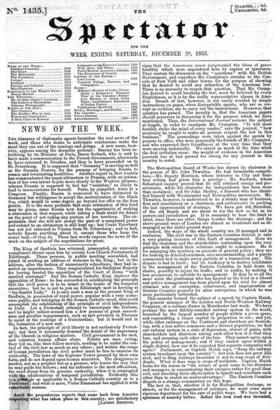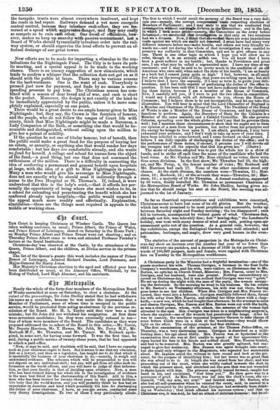Indeed, the ways of the whole country are ill managed
and in confusion. The civil war in the Eastern Counties district is only a very glaring instance of this fault of management. Here we find the chairman and the shareholders contending upon the very principle with which their relations ought to commence. He for managing the territory on grounds of general policy; they are for looking to detailed exactness, nice accountantship, and a purely oommercial test to make every particle of a transaction pay. The dispute is bad in itself; but its tendency is to destroy confidence in the management of the Eastern Counties to beat down its shares, possibly to injure its traffic, and so really, by making it less prosperous, to enfeeble its management. It may be so all the more since the gentleman who has figured as the head in a liberal and active management has been placed upon his trial for almost criminal acts of corruption, connivance, and impropriation- of Eastern Counties property for alien enterprises, in which he was more particularly interested. This anarchy formed the subject of a speech by Captain Huish, the general manager of the London and North-Western Railway Company, at a railway dinner in Manchester last week. We have perhaps the most thickly-ramified railway system in the world, traversed by the largest number of people within a given space, and representing a larger capital in proportion to size ; and yet, while other railways on the Continent and elsewhere are flourish- ing, with a less active commerce and a thinner population, we find our railway system in a state of depression, almost of panic, with i
shareholders and chairman asking each other how it s that they lose, and accusing each other of the loss. They cannot agree upon the policy of management ; and if they cannot agree within a
single district, how can it be expected that separate companies will agree ? Parliament, as Captain Huish says, "flung the railway
system broadcast upon the country " : but iron does not grow like seed, and to fling railways broadcast is not to reap crops of divi- dends. What it does reap is crops of accidents. Captain Haigh looks for the rescue in "the return of good sense to the directors and managers, in concentrating their energies rather for good than evil, and directing their efforts rather to benefit and conciliate each other than to snatch an undue advantage." The Eastern Counties dispute is a strange commentary on this hope. The fact is, that, whether it is for Metropolitan drainage, or streets, or for the management of railways, we want some more
rigorous department for the care of public ways. We have had a specimen of anarchy before. Before the iron road was invented, the turnpike trusts were almost everywhere insolvent, and kept the roads in bad repair. Railways demand a yet more energetic central control, because they interlace each ,other, they are tea- versed at a speed which aggravates danger, and they may easily so compete as to ruin each other. Our dread of officialism, how- ever, makes us keep up anarchy With passive contentment, lest a Board of Works should tyrannica]ly-introduce order into the rail- way system, or should supervise the local efforts to prevent an ef- fectual drainage of our great towns.



























